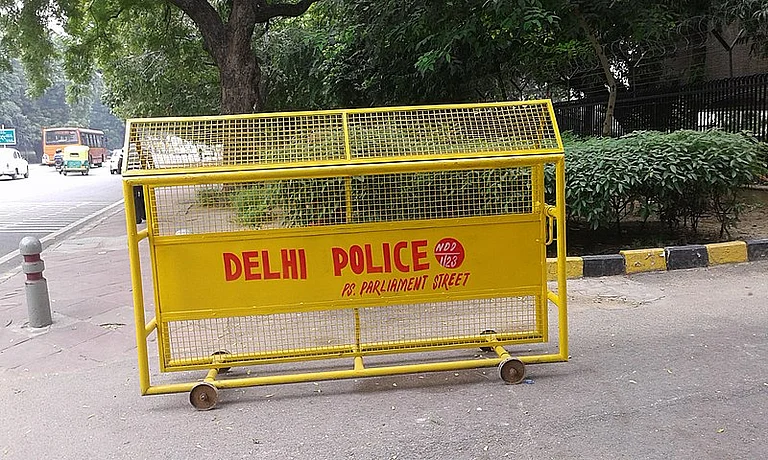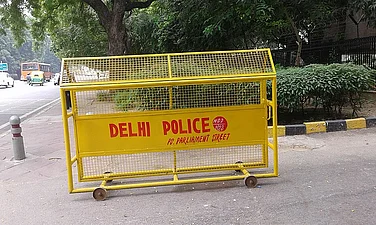WHENa 46-year old industrialist was admitted to Delhi's Escorts Heart Institute and Research Centre (EHIRC), on May 6, he couldn't have imagined that he would be attending his son's graduation in England the following week while EHIRC cardiologists monitored his ECG from the capital, as many times a day as he wished it, and gave him instant medical advice over the phone.
Following an angioplasty, the industrialist was discharged on May 12 and flew out the next evening, as scheduled, armed with a 'Heart Alert' beeper—a device no bigger than a pocket transistor with which to record his ECG in about 50 seconds, dial the EHIRC hotline in Delhi and play it back into a computer which records it with pin-point accuracy and simultaneously displays it on screen for the cardiologist on duty at the Heart Command Centre. When he called the hotline, on May 16, from London's Heathrow airport to ask if he was fit to proceed to the US, consultant cardiologist H.S. Rissam, with the tap of a key, recalled his past ECGs and medical history and wished him Bon Voyage .
Two decades after it was introduced in the West, where it is still offered only by select hospitals, Cardiac Telemedicine has found a firm footing in India. Last week, EHIRC formally launched its 'commando-style' Mission Save Heart, making it, officially, the second hospital to offer state-of-the-art telemedicine facility after Apollo Hospitals which introduced its Heartline service last July in its Madras and Hyderabad branches and at the brand new Indraprastha Apollo Hospital, Delhi, in January this year. Operational round the clock, 365 days a year, both leading hospitals' objectives are identical: to reach expert cardiac care to patients within the first 'golden hour' from the onset of the heart attack so as to minimise damage to heart muscles.
Coronary Artery Disease is the number one killer in the world and its incidence in India is as high as in the West. According to renowned cardiologist and EHIRC Executive Director Naresh Trehan: "Twenty per cent of all heart patients in India die of heart attack, half of whom never get to a hospital and the rest reach after a considerable delay and die within a month of hospitalisation. Having minimised death during heart surgery at Escorts to 1 per cent, we are now looking to plug this gap in reaching coronary care to victims within the golden hour, thus not only saving lives but also preventing them from becoming cardiac cripples.
Nomenclature apart, both, Mission Save Heart and Heartline use state-of-the-art Israeli technology and are patterened on established western models and backed by 22 and 13-bedded heart command stations, respectively, a fleet of mobile cardiac care ambulances, each telelinked to the heart command station and manned by a cardiologist. These special ambulances will be pre-positioned at strategic locations in the city to cut commuting time. Both hospitals claim "ready access" to a helicopter, which can be converted into an airborne CCU "within minutes" to ferry patients within a 300-km range, though neither has carried out an air rescue yet. While Apollo has a helipad, Trehan says EHIRC has approached the Directorate General of Civil Aviation for permission to land near the hospital.
The first phase of Mission Save Heart will focus on south Delhi with the three existing mobile CCUs positioned at the EHIRC near New Friends Colony. Trehan proposes to expand gradually by setting up satellite heart centres in different parts of the city where additional mobile CCUs will be positioned. Possibilities of additional tie-ups with existing hospitals are being explored and Trehan aims to set up a network covering "the entire north India".
Indraprastha Apollo's administrator Anjali Kapoor informs that the southern-based hospital chain aims to set up 30 Apollo-affiliated centres at existing hospitals and nursing homes in the capital "which will be upgraded by us". Senior cardiologist M.C. Garg adds that Apollo's existing unit of two mobile CCUs is to be expanded first to eight and eventually to 20. Says Garg: "Mobile CCUs like ours are highly expensive and only select hospitals in the West can afford them." In addition, Apollo is also the Indian franchisee for the Israeli telemedi-cine technology giant, Aerotel, and, says Kapoor, is capable of setting up similar technology in other hospitals.
Technology, manpower and smooth coordination are essential for the success of Heartline and Mission Save Heart. While the latest technology enables instant and accurate transmission of ECG data over the telephone, ultra-modern mobile CCUs facilitate early rescue and initiation of preliminary treatment and simultaneous transmission of the victims' condition en route to the heart command station which is on alert and capable of instant evaluation of the exact nature of the ailment and risk faced by the patient and decide on the type of treatment or surgery required.
But how does it all work? When a person subscribes to EHIRC's 'Heart Alert Service' (a component of Mission Heart Save) or Apollo's Heartline, their detailed medical history, physical examination report and baseline ECG are recorded for future reference. Each subscriber is given a compact, hand-held beeper which records and transmits accurate ECG data via phone. Subscribers can be individuals, medical practitioners, nursing homes, health clubs, hotels, airports, ambulance services etc, and the charges and number of free calls offered vary accordingly.
EHIRC offers a 9-lead model for patients and a 12-lead one for use by medical professionals and institutions on term lease as well as outright purchase (Rs 25,000 per 9-lead model) schemes. Apollo offers its 12-lead model for practitioners and institutions, two 8-lead models for persons susceptible to heart attacks and a 3-lead model for monitoring post heart attack condition of pacemaker patients under lease, outright purchase (Rs 17,000 to 27,000 for 8-leads and Rs 35,000 for 12-lead) and hire-purchase schemes. (Note: more the number of leads higher is the ECG recording and transmission accuracy.) In case of chest pain an individual subscriber can transmit his ECG over the phone and physicians, hospitals and institutions too can seek instant expert opinion on whether a chest pain is caused by indigestion or a heart attack. Instant reassurance is given in case of a normal ECG and, in case of an abnormality, qualified guidance is provided by cardiologists on duty. Where possible, mobile CCUs are rushed to ferry the victim to the heart command station. When it is not possible to reach on time, the victim is guided to the nearest cardiac centre and picked up, if required, by a mobile CCU.
The biggest advantage is that potential and serious heart patients no longer need to be hospitalised for long durations for monitoring alone. Armed with their beeper they are free to travel anywhere with the assurance that expert cardiac advice is just a phone call away. While the patients save money, as the cost of lease or purchase of beepers is invariably far less than the cost of hospitalisation at EHIRC or Apollo, the latter can provide more beds to critical patients.
However, despite the overt similarities, Trehan says: "Such a project entails a huge commitment on our part—from monitoring to rescue—and I have been sitting on this technology for over two years and perfecting it till it became truely diagnostic. We aim to reach a heart attack victim within 44 minutes of the onset of the attack and start resuscitative care. Nobody else in India can make such a claim nor has devoted the kind of time and effort in perfecting the process so that it proceeds without a glitch. Therefore, our Mission Save Heart is the only one of its kind in India. Our only limitation is posed by a 22-bed Heart Command Centre which gets filled rather quickly."
Reiterating that Heartline was commissioned by Apollo last July, Garg insists that infrastructure and facilities at Apollo are "on par with the best anywhere". But the real issue, he concludes, is not about who pioneered the service in India, "but the fact that such services are available to Indian heart patients, and it will be a boon to the country if these can be successfully established on a wider scale."






















